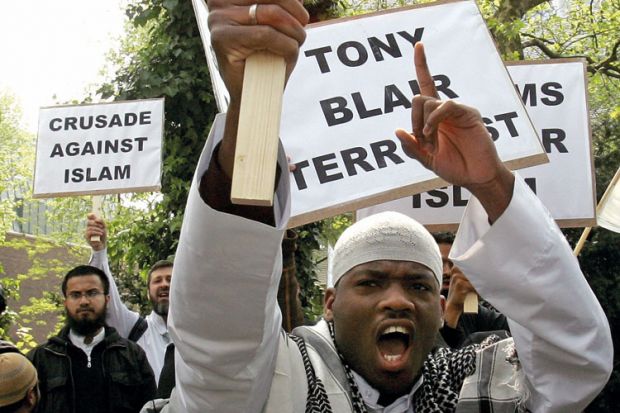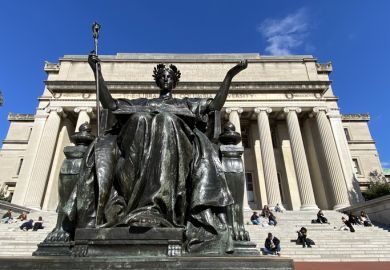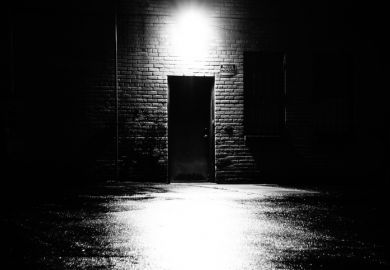Source: PA
London protest: Michael Adebolajo, front, murdered Fusilier Lee Rigby in 2013
The University of Greenwich was targeted by extremist Islamic groups when one of the killers of a British soldier was a student there, an internal inquiry by the institution has suggested.
While there is no evidence to suggest that the university or its student societies “contributed” to the radicalisation of Michael Adebolajo, there is “some evidence of increased activism on campus” while Adebolajo was an undergraduate, a university panel launched in the wake of the May 2013 attack on Fusilier Lee Rigby found.
The investigation was launched by David Maguire, Greenwich’s vice-chancellor, three days after Adebolajo was filmed with a meat cleaver having murdered the 25-year-old soldier close to his barracks in Woolwich, southeast London. Adebolajo, then 28, was jailed for a whole-life term, while his 22-year-old accomplice Michael Adebowale was given a 45-year minimum term.
Greenwich’s inquiry panel, chaired by Edward Walker-Arnott QC, and including the vice-chancellor of a university currently at the centre of the latest storm over Islamic extremism and higher education, published its report last year but the document was put online without any press announcement.
Its contents have emerged as ministers lock horns in a row over Home Office plans to force universities to ban non-violent “extremist” speakers after the Islamic State “executioner” known as “Jihadi John” – who has appeared in several IS beheading videos – was unmasked as Mohammed Emwazi, a University of Westminster graduate.
Greg Clark, the universities and science minister, has reportedly said that a ban is unworkable, while universities and student leaders say the plans threaten freedom of speech and institutional autonomy.
Aminul Hoque, lecturer in education at Goldsmiths, University of London, who studies British Islamic identity, said that universities were being used as “scapegoats” in the political battle over radicalisations, whose causes were “complex, multitude and systemic”.
“Students are more socio-culturally conscious and are politicised and perhaps angry by the sense of social injustice they see around them, but that does not make them extreme or radicalised,” he said.
However, Anthony Glees, director of the University of Buckingham’s Centre for Security and Intelligence Studies, said that universities should do more to counter the “normalisation of extreme violence towards individuals on the grounds of their beliefs”.
“Universities are given a massive amount of money and have huge clout to influence the policy debate, yet they are not doing something [banning extremist speakers] normal people consider necessary,” he said.
In its report, the Greenwich panel – which included Westminster vice-chancellor Geoff Petts as well as local Labour MP Nick Raynsford – found that the “area in and around Greenwich was a significant centre for radical and extremist Islamic movements” towards the end of Adebolajo’s time at the university.
It describes how Adebolajo was a mediocre student, initially rejected from Greenwich to study psychology in 2003-04. He was offered a place in building surveying through clearing, despite gaining just 30 Ucas tariff points – currently worth less than a single E grade at A level.
After failing his first year, he transferred to the first year of a politics degree, but his engagement with his studies “appeared to have diminished”, the report says.
“The marks are indicative of a student not attending lectures or seminars”, although he was permitted to retake the first year, it adds.
Only one member of staff had any memory of Adebolajo, who appears to have dropped out of Greenwich by his third year there, and just one student gave evidence about Adebolajo to the panel.
The student, Matthew Astill, said he met Adebolajo after writing an article for the student magazine in January 2006 which had criticised a Stop Islamophobia Campaign operating on campus. Adebolajo and another man – a non-student – “essentially…asked [Astill] to write a further article withdrawing his attack on the Stop Islamophobia Campaign”, the report said.
The panel heard evidence that the campaign supported Hizb ut-Tahrir, an Islamic political party given a “no platform” decree by the National Union of Students, and, according to Mr Astill, both were “driven from outside the university and were seeking to recruit within the university”, but had “very little success”.
The panel heard how the nearby Greenwich Islamic Centre had struggled to rid itself of several radical clerics around this time. One of them, Omar Bakri Mohammed, founder of the banned extremist group Al Muhajiroun, has boasted about recruiting Adebolajo at a stall in the Greenwich area.
But the panel found that within the university, only a “small number of individual students” were involved with the Stop Islamophobia Campaign, while the Muslim society had “no pattern of inviting extremist speakers” to campus. “We can find no evidence suggesting a group or activities on the campus which could have effected radicalisation,” the report concluded.
Register to continue
Why register?
- Registration is free and only takes a moment
- Once registered, you can read 3 articles a month
- Sign up for our newsletter
Subscribe
Or subscribe for unlimited access to:
- Unlimited access to news, views, insights & reviews
- Digital editions
- Digital access to THE’s university and college rankings analysis
Already registered or a current subscriber? Login





